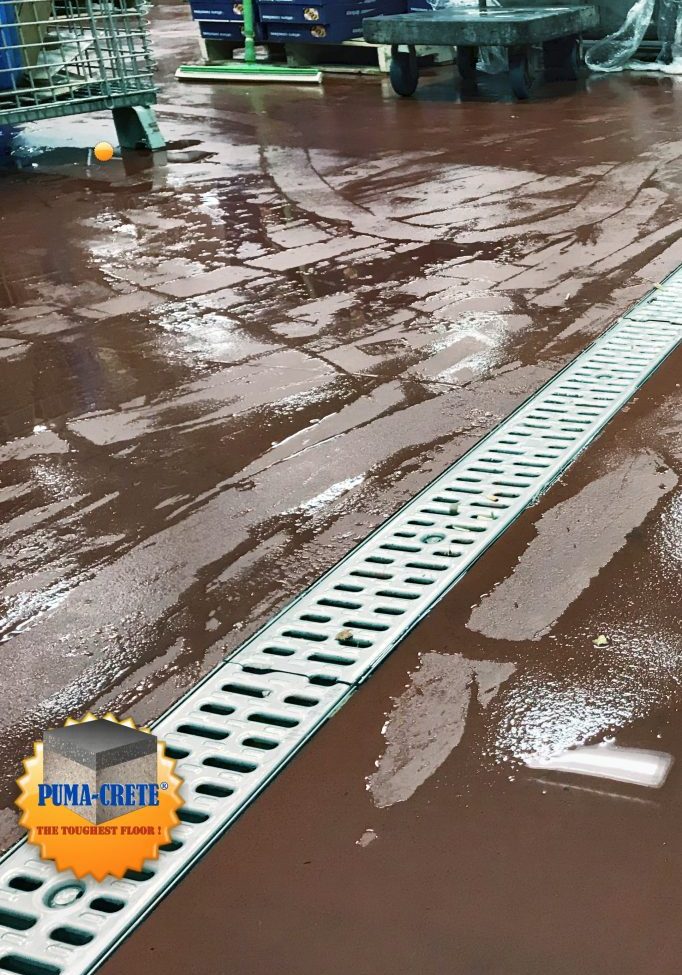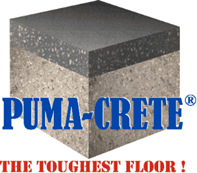Food Processing Floor Solutions by PumaCRETE
PumaCRETE manufactures and installs seamless urethane concrete systems engineered for the modern food processing floor—built to handle heavy traffic, thermal shock, moisture, and aggressive sanitation. From coolers and freezers to packaging lines and truck bays, PumaCRETE delivers durable, hygienic floors that help you pass audits and reduce downtime.

Why PumaCRETE for Your Food Processing Floor
-
Heavy-duty, impact & abrasion resistant for tow motors, totes, and carts. epfloors.com
-
Thermal shock & cycling tolerance for hot washdowns, oven heat, and cold rooms. (Use 3/8 in. in extreme thermal zones.) epfloors.com
-
Moisture tolerant installation and long-term performance in wet enviroments. PumaCRETE Industrial Flooring
-
Chemical resistance to common CIP agents, organic acids, sanitizers, and solvents. epfloors.com+1
-
Sanitary & non-porous surface with optional antimicrobial additive; easy to clean. epfloors.com+1
Where Food Processing Floors Work Best
Typical areas: coolers, freezers, blast freezers, kitchens, tank lines, processing/packaging, loading docks, chemical storage, and warehouse transitions. epfloors.com
Related applications & sectors:
Meat & Poultry • Dairy • Seafood • Bakeries • Fruit/Vegetable/Juice • Beverage • Brewery/Distillery

Materials & System Options
PumaCRETE Urethane Concrete (1/4 in. standard; 3/8 in. for extreme thermal)
-
One-pass HF screed/trowel option; polyaspartic topcoat for fast return to service.
Additional solutions for special conditions:
-
Slope-to-Drains and Drain Installation to remove standing water.
-
Antimicrobial additive for added protection.
-
Applied Over Brick or Tile where needed.
PumaCRETE® URETHANE CONCRETE SYSTEMS for FOOD and BEVERAGE FACILITIES
Compliance, Inspections & Certifications
PumaCRETE food processing floors are USDA-approved and support certification goals for SQF, IFS, FSSC 22000, BRC, and GFSI facilities.
-
Track current food recalls and safety alerts when planning upgrades: USDA FSIS.
-
Learn more about FSMA requirements (FDA).
-
Explore SQFI guidance and GFSI benchmarking for hygienic design.
(External references for context: USDA FSIS recalls, FDA FSMA, SQFI, and GFSI.)
Performance in Harsh Conditions
Thermal Shock & Cycling
Handles hot water >160°F washdowns, steam, oven heat, and fryer oil; performs in cold rooms and blast freezers (follow temperature staging for freezer installs).
Chemical Resistance
Withstands oxidizers, organic acids (incl. lactic), and typical nitric/phosphoric CIP cleaners; specialty topcoats available for concentrated chemical zones.
Slip Resistance
Permanent built-in texture maintains non-slip profile throughout the floor thickness—doesn’t wear off like coatings with sacrificial grit.
Compare Food Processing Floor Options
Urethane concrete has become the “go-to” choice versus epoxy or vinyl ester in wet, cold, and chemically aggressive food environments—due to superior moisture tolerance, chemical/thermal resistance, and long-term durability. See:
-
Food Processing Floor Options
-
Troweled Flooring for Food Processing
Installation: Turn-Key by PumaCRETE Crews
PumaCRETE provides consultation/specs, budgeting, scheduling, materials, surface prep (dust-controlled), application, QA checklists, and training on cleaning/care—using our own crews nationwide (with international capabilities).
FAQs: Food Processing Floors
What thickness should I specify?
Standard is 1/4 in.; use 3/8 in. for high thermal shock areas (e.g., such as hot washdown and liquid nitrogen zones).
Can you install inside operating coolers/freezers?
Yes—standard systems cure down to ~35°F with staging; for sub-freezing operations, discuss acrylic/MMA options.
Is the surface antimicrobial?
PumaCRETE is non-porous and can include an antimicrobial additive to inhibit bacterial growth.
Do these floors meet audit standards?
They support USDA, SQF, and GFSI-aligned programs when paired with proper sanitation and drainage design.
Get Specifications or a Quote
-
Talk to Technical Support: Contact PumaCRETE • 1-800-808-7773
-
See Color Guides & TDS: Color Guides • Technical Data Sheets
-
Explore Food/Beverage Floors: Food & Beverage Processing Floors (PumaCRETE) PumaCRETE Industrial Flooring
Helpful Links
External References
-
USDA FSIS – Current Recalls & Public Health Alerts (context for sanitation/recall risk). epfloors.com
-
FDA – FSMA Rules & Compliance (food safety modernization).
-
SQFI – SQF Code and guidance for facilities.
-
GFSI – Benchmarking requirements and hygienic design references.
Enhanced resistance to Chips, Spalls/Impact
PumaCRETE® handles repetitive scraping and scratching and wear, better than competitive systems.
Permanent Non-Slip Texture
PumaCRETE® retains an anti-slip texture, even as it wears.
Resistant to Thermal Shock & Cycling
Withstands hot spills and repeated thermal cycling (hot washdowns, steam cleaning, etc.) without breaking down from -50 to +250 deg. F. (-45 to +121 deg C)
Virtually No Odor During Installation
PumaCRETE® has no dangerous VOC’s that can taint your raw materials or finished product during (or after) installation.
Chemical Resistance
Excellent resistance to most solvents, acids and alkalis. Extra chemical resistant options are available for severe/concentrated CIP (clean in process) cleaning chemicals.
Long Term Durability
PumaCRETE flooring systems are designed for long term durability. Customized solutions may be designed to meet any special area needs.
USDA / SQF Approved
PumaCRETE® meets USDA and SQF requirements for seamless resinous flooring.
Long Term Durability
Exclusive five-year Warranty.
Moisture Tolerant
PumaCRETE® may be applied over damp surfaces. Withstands up to 25 lbs of vapor pressure passing thru the concrete slab, without delaminating, blistering, or cracking (Many competitive systems are rated <5 lbs).
Cool Temperature Installation
PumaCRETE® may be installed in operating coolers or outdoors, at 35-45 deg F.
Anti Microbial
PumaCRETE® does not support the growth of mold or bacteria.
Fast Turn-Around
401-HF PumaCRETE is a one-pass screed/mortar system. Projects can be completed quickly, with limited costly downtime.

